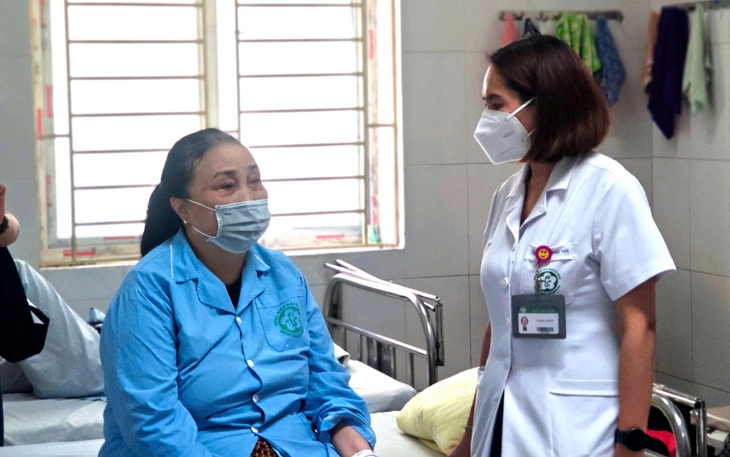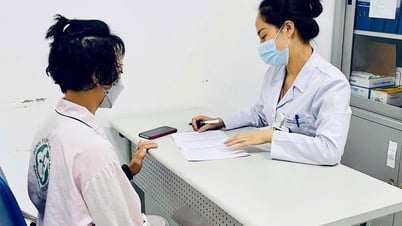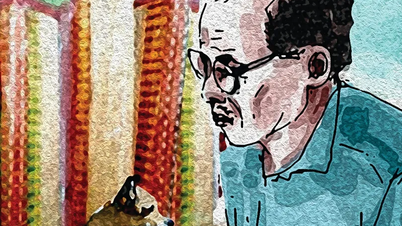
Doctor Doan Thi Hue, Institute of Mental Health, examines a patient - Illustration: D.LIEU
This is the sharing of Dr. Doan Thi Hue - Institute of Mental Health, Bach Mai Hospital - during the information session on symptoms and treatment of sleep deprivation organized by the hospital on June 9.
When sleep becomes fear
Ms. D. (40 years old, office worker) used to have a stable life, a happy family, and good health. But when work pressure increased and her children started taking exams to move up to a higher level, she started having trouble sleeping. At first, she just slept late, then it became chronic insomnia, tossing and turning for hours, waking up in the middle of the night and not being able to fall back asleep.
Even though she had time to rest during the day, she couldn't sleep. Her body was tired, her mind was irritable, and her ability to work was reduced. She tried sleeping pills, but she gave up halfway because she felt lethargic all day. Eventually, sleep became a fear.
When she arrived at the Institute of Mental Health (Bach Mai Hospital) recently, Ms. D. was exhausted. Doctor Pham Cong Huan said she was diagnosed with non-organic insomnia, requiring a combination of medication, relaxation, exercise and psychotherapy. After two weeks, she was able to sleep 5-6 hours a night and felt more comfortable.
Another patient was a 49-year-old male driver who used to drive long-haul trucks. After switching to driving a four-seater, he felt that it was not suitable for him. He fell into prolonged stress, leading to insomnia and reduced ability to concentrate while driving. He was referred for psychological treatment and prescribed outpatient medication.
Insomnia is no small matter.
According to Dr. Doan Thi Hue, insomnia is a common sleep disorder that can occur in all ages, from students, working people to the elderly. Research shows that nearly 1/3 of the population has complained of insomnia, but only 6-15% are actually diagnosed and treated properly.
"Sleep disorders involve problems with the quality, duration, and quantity of sleep, leading to daytime fatigue and impaired functioning.
This condition often occurs along with other physical or mental health conditions such as depression, anxiety or cognitive disorders. There are many different sleep disorders, of which insomnia is the most common," said Dr. Hue.
However, not everyone who has trouble sleeping is considered to have a sleep disorder. To be diagnosed, the patient usually has signs such as difficulty falling asleep (taking more than 30 minutes), intermittent sleep, waking up too early, not sleeping deeply, being tired and having reduced concentration during the day, etc. This condition lasts for at least 3 months.
Prolonged insomnia not only affects the mind but is also a risk factor for many chronic diseases such as cardiovascular disease, diabetes, depression, Parkinson's disease or dementia, etc.
Doctor Hue said that people at high risk of insomnia include: shift workers, students under exam pressure, premenopausal women, work stress, the elderly, etc.
"Using electronic devices before going to bed or living an irregular life is also the cause of difficulty sleeping and sleep deprivation. Blue light from phones and tablets inhibits melatonin, the hormone that regulates sleep, causing the brain to "misunderstand" that it is still daytime, thereby preventing sleep," Dr. Hue stated.
Many people are afraid to use drugs because they fear dependence. However, Dr. Hue emphasizes that pharmaceutical chemistry is one of the three pillars of insomnia treatment, along with behavioral adjustment and neuromodulation. If the right type, right dose, and under the guidance of a doctor are used, safety is guaranteed.
Doctor Bui Van Toan - Institute of Mental Health, Bach Mai Hospital - added that unhealthy lifestyle, irregular eating and sleeping can lead to sleep disorders.
Accordingly, to reduce insomnia, first of all, before going to bed, you need to pay attention to sleep hygiene.
"Do a deep breathing exercise, followed by alternating tensing and relaxing of muscle groups. For example, arms, neck, back, legs throughout the body. Pay attention to the feeling of relaxation after the process compared to the feeling of tension before and practice this technique once a day and before going to bed.
Do not eat too much, avoid caffeine after 3pm, reduce electronic light before going to bed..., do light exercise and get psychological treatment if there is an accompanying disorder. In some severe cases, it is necessary to apply chemical and neuromodulation methods," said Dr. Toan.
Source: https://tuoitre.vn/ngay-ngu-gat-gu-dem-ve-mat-ngu-lam-sao-de-tim-lai-giac-ngu-dung-nghia-20250609160029895.htm




























![[Photo] Prime Minister Pham Minh Chinh receives leaders of several Swedish corporations](https://vphoto.vietnam.vn/thumb/1200x675/vietnam/resource/IMAGE/2025/6/14/4437981cf1264434a949b4772f9432b6)




































































Comment (0)